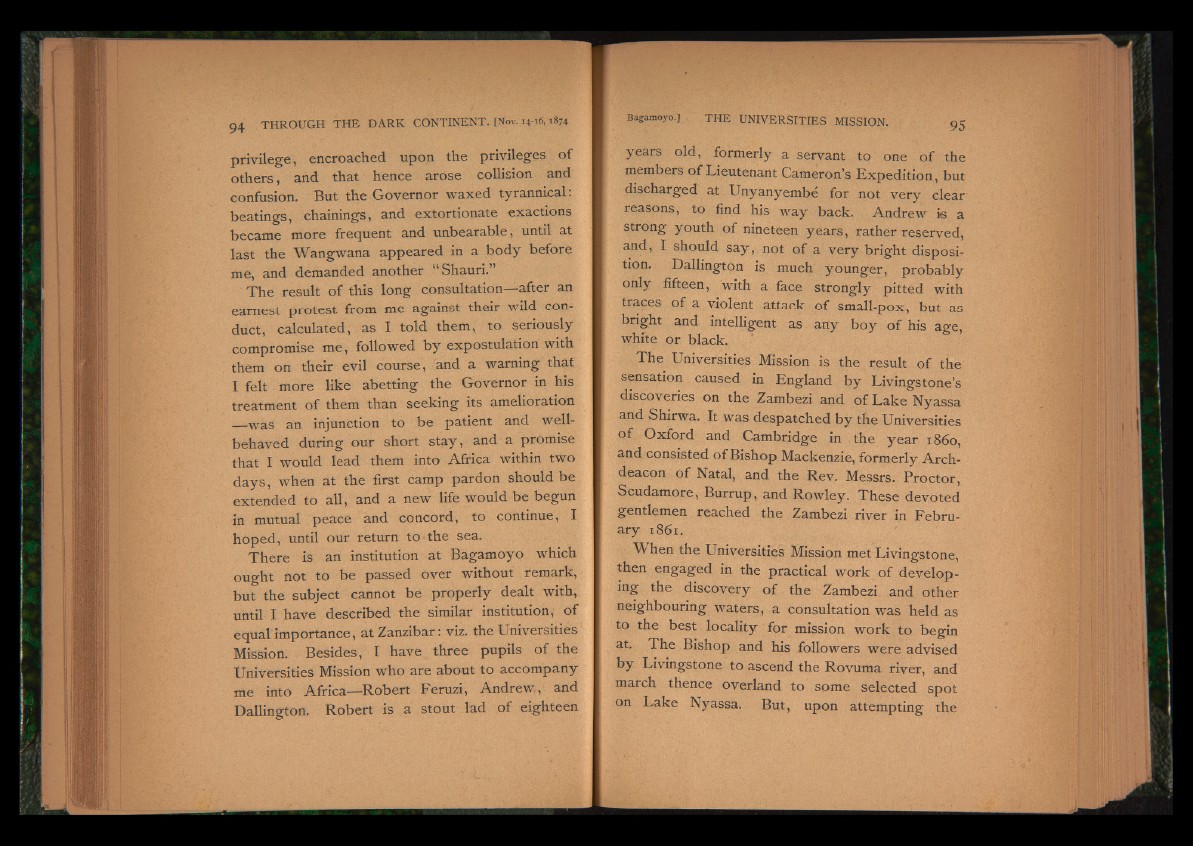
privilege, encroached upon the privileges of
o th e rs , and that hence arose collision and
confusion. But the Governor waxed tyrannical.
beatings, chainings, and extortionate exactions
became more frequent and unbearable, until at
last the Wangwana appeared in a b od y before
me, and demanded another “ Shauri.”
The result o f this long consultation— after an
earnest protest from me against their wild conduct,
calculated, as I told them, to seriously
compromise me, followed b y expostulation with
them on their evil course, and a warning that
I felt more like abetting the Governor in his
treatment o f them than seeking its amelioration
— waS an injunction to be patient and well-
behaved during our short s ta y , and a promise
that I would lead them into Africa within two
d ay s, when at the first camp pardon should be
extended to all, and a new life would be begun
in mutual peace and concord, to continue, I
hoped, until our return to the sea.
There is an institution at Bagamoyo which
ought not to be passed over without remark,
but the subject cannot be properly dealt with,
until I have described the similar institution, o f
equal importance, at Zanzibar: viz. the Universities
Mission. Besides, I have three pupils o f the
Universities Mission who are about to accompany
me into Africa— Robert Feruzi, A n d rew , and
Dallington. Robert is a stout lad o f eighteen
years old, formerly a servant to one o f the
members o f Lieutenant Cameron’s Expedition, but
discharged at Unyanyembe for not v e ry clear
reasons, to find his w a y back. Andrew is a
strong youth o f nineteen years, rather reserved,
and, I should sa y , not o f a ve ry bright disposition.
Dallington is much younger, probably
only fifteen, with a face strongly pitted with
traces o f a violent attack o f small-pox, but as
bright and intelligent as any b o y o f his age,
white or black.
T he Universities Mission is the result o f the
sensation caused in England b y Livingstone’s
discoveries on the Zambezi and o f L a k e Nyassa
and Shirwa. It was despatched b y the Universities
o f Oxford and Cambridge in the y e a r i860,
and consisted o f Bishop Mackenzie, formerly Arch deacon
o f Natal, and the Rev. Messrs. Proctor,
Scudamore, Burrup, and Rowley. These devoted
gentlemen reached the Zambezi river in February
1861.
When the Universities Mission met Livingstone,
then engaged in the practical work o f deve loping
the discovery o f the Zambezi and other
neighbouring waters, a consultation was held as
to the best locality for mission work to begin
at. The Bishop and his followers were advised
b y Livingstone to ascend the Rovuma river, and
march thence overland to some selected spot
on Lake Nyassa. But, upon attempting the